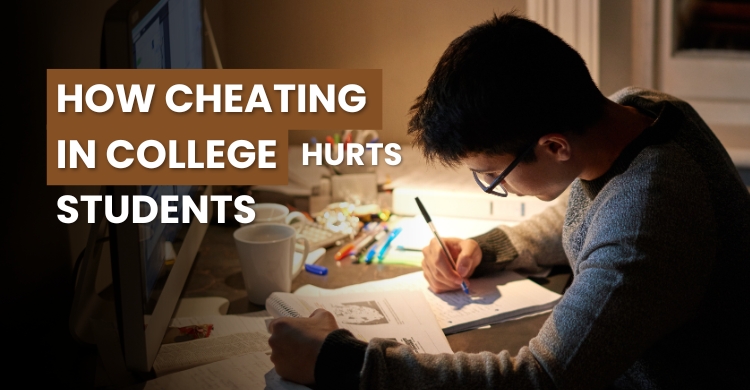Reports show that there has been a substantial rise in scholastic deceit amongst pupils throughout the COVID-19 pandemic, according to professionals in the field.
Taking part in scholastic Cheating throughout university carries significant risks and a series of possible implications, consisting of scholastic failing, suspension, and even expulsion. Despite these dangers, unfaithful has come to be increasingly widespread and quickly accessible.
Table of Contents
“A lot of people rip off a little,” says David Pritchard, a physics professor emeritus at Massachusetts Institute of Technology who has researched academic Cheating in online courses. “There’s also a few people who cheat a lot.”
Though it might be appealing and feel harmless, specialists warn college students to think twice before ripping off on coursework. Below’s just how to know what is typically thought about unfaithful and the prospective repercussions.
Effective Study Habits and Resources for College Students
The academic stability sector is a lucrative market, with businesses generating significant profits from products or services developed to facilitate or prevent student unfaithful. Educational technology businesses make money from students who utilize their products to prevent scholastic stability regulations, while others make income from establishments seeking to promote scholastic integrity.
Trainees likewise utilize timeless classroom actions like doodling covert notes someplace or making use of technology such as smartwatches. Copying a schoolmate’s project or plagiarizing parts of released benefits a paper stays popular techniques.
A lot of those techniques show up to have been changed by expert systems and generative language versions like ChatGPT and Google Bard, which provide some solutions like writing, editing enhancing, and concept generation free.
Pritchard keeps in mind that ChatGPT has carried out well on tests in specific topics, and the American Bar Association reported in March 2023 that it passed the Uniform Bar Exam by “a significant margin.” While some teachers say they’re keeping an open mind regarding ChatGPT and comparable tools, others say it’s impossible to overlook the truth that students are using them to rip off.
ChatGPT “is the future of disloyalty,” Pritchard claims.
Professor Rebecca Hamlin, a professor at the University of Massachusetts– Amherst, was selected to the scholastic honesty board and has seen an increase in trainees making use of ChatGPT for academic cheating. She uncovered 12 circumstances of unfaithfulness in her courses during the springtime 2023 semester.
“While some trainees might view ChatGPT as an important device for improving their writing abilities, I’m hesitant to endorse its usage. As someone who frequently checks out high-quality writing, it’s glaringly obvious when a student has counted on AI help. The prospective dangers surpass any perceived advantages, in my viewpoint.”
But a lot of trainees slide through unnoticed or cheat in other low-profile means, she claims.
A lot of trainers take too lightly simply exactly how rampant the issue is, says Eric Anderman, a professor at The Ohio State University and interim dean at Mansfield University. “We assume we’re underestimating it because individuals do not intend to admit to it.”
Right here’s what academic honesty experts say university students ought to understand about the prompt and lasting repercussions of cheating.
The Effects of cheating in Higher Education
Regardless of the unfaithful method, pupils are just hurting themselves and their understanding procedure, experts state.
“I know that seems cheesy, but I kind of do not understand why someone is going to waste their time and money most likely to college if they don’t wish to learn just how to create,” Hamlin claims. “That’s possibly one of the top 2 to 3 skills that you acquire when you go to university.”
According to Russell Monroe, the supervisor of a scholastic integrity-free University in Virginia, trainees who rip off lose out on the authentic sense of accomplishment that comes from making their qualities truthfully.
“There’s a feeling of dignity in recognizing that I got a quality that I gained, whether that’s for a task or a class,” he claims. “You can take a look at your level with satisfaction understanding this is something I achieved on my very own benefit and didn’t have to outsource anything to anybody else or steal or plagiarize.”
Some penalties can have a lasting effect and financial repercussions. They are often less severe for novice wrongdoers, but colleges maintain documents of such actions. Pupils who remain to rip off and obtain caught risk falling short of a class, obtaining academic suspension, or being gotten rid of from the institution, which may feature a note on their records describing why they were dismissed. This designation will likely make it more challenging to enlist at one more college, experts state.
Students who stop working on a course because of academic deceit are generally permitted to retake it. If it’s a course required for graduation, they do not have a choice. Either way, that implies even more cash out of pocket, maybe in student loans.
Struggling in a program can dramatically impact a trainee’s GPA, specifically if they do not take back the class and boost their grade. This might put their scholastic help or scholarships in jeopardy and potentially lead to probation.
Each school has its plans and corrective actions, and teachers might vary in how they deal with academic deceit. Some might manage it by themselves while others might send it to a disciplinary board. It often relies on the severity of disloyalty, Monroe claims. For instance, cheating on a conversation board assignment isn’t viewed as significant as plagiarising a dissertation or last exam paper, or cheating on a credential or certification exam, he states.
According to professionals, engaging in plagiarism when it involves capstone program documents or any other jobs that are linked to college graduation is an incredibly severe offense that has the prospective to put a trainee’s college graduation in danger.
“We are placing our stamp of approval on you to carry on to the following step,” Monroe claims. “That following step could be college graduation, however, if we’re doing that based upon bad information or incorrect details, that’s a serious trouble.”
Even pupils who assume they got away with cheating might experience repercussions, such as losing out on fundamental details that they require to learn and apply in higher-level classes.
In addition, grads who cheated and maybe also wound up with great qualities may find themselves starting their occupation unprepared and not have the required knowledge and abilities. And for tasks that have a safety component, not prepared employees can put themselves and others in danger.
Periodically, instances develop where scholastic cheating is revealed at a later time, causing the devastation of one’s expert course, typically in a public and humiliating fashion.
Know What Is and Isn’t Cheating
While some students are cognizant that they’re cheating and see it as simply a way to an end, not all kinds of scholastic cheating are deliberate. Oftentimes, it’s an accident made while under stress and anxiety or when a trainee has put things off, professionals state.
At times, students make errors because they lack the needed readiness to deal with the needs of college-level tasks. For instance, if resources are not appropriately pointed out in a term paper, it can lead to complaints of plagiarism.
According to Anderman, one reason is that secondary school pupils are not regularly advised on how to appropriately mention and assess web resources. As a result, when they transition to college, numerous are not aware that they can not simply search for info online and include it in their papers without proper citation. Therefore, they usually face the consequences of not mentioning their resources accurately.
According to experts, colleges often make use of different sorts of plagiarism-detection programs like Turnitin. These software application systems determine academic papers that may include unattributed or improperly attributed content. By using these devices, colleges can promote academic integrity and substantially lower the circumstances of plagiarism.
According to professionals, particular types of cheating, like deliberate plagiarism, purchasing papers from the web, or working with someone to do coursework, ought to be quite apparent. Monroe describes this as “agreement disloyalty,” which is a major infraction that can cause expulsion from Liberty.
He discusses that it can be very challenging for us to determine when this is taking place. However, once we become aware of it, we concern the situation with great severity because it might indicate that substantial parts of your entire scholastic program were not completed by you, the trainee.
The standards for collective jobs and making use of AI tools are much less simple in many cases, according to Monroe. While Liberty University does not ban making use of AI or services like ChatGPT, there are ethical factors to consider to remember. Students are permitted to use these resources to modify and attract ideas from their jobs, but any type of sent assignments must be initialed and developed by the pupils themselves.
In addition, professionals advise against using internet-based companies that assert to be coaching establishments but primarily aid pupils in disloyalty. Universities provide numerous scholastic support choices that students can avail of, without incurring any type of additional expenditures.
“If a pupil is having a problem with a difficult situation or feels that they won’t be able to complete their work with time, I would strongly recommend them to reach out to their professor and check out feasible choices,” Monroe recommends.
According to him, numerous teachers are open to obtaining late entries. At Liberty University, the policy requires deducting 10% from the total grade of a late assignment.
“We prefer a prompt entry of work,” Monroe claims, “but contact your teacher. They are absolutely happy to deal with trainees within the scope that they’re permitted to. That would certainly be a far better scenario than turning to disloyalty.”







